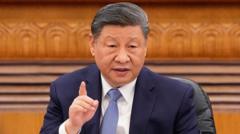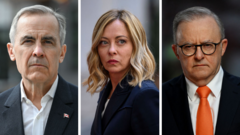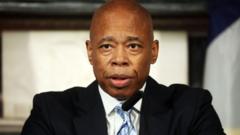**As European alarm grows over Trump’s foreign policy, Secretary of State Marco Rubio’s NATO visit becomes a test of U.S.-Europe relations amidst the ongoing crisis in Ukraine.**
**Trump's Foreign Policy Scrutinized: Rubio's NATO Visit Amidst Growing Tensions**

**Trump's Foreign Policy Scrutinized: Rubio's NATO Visit Amidst Growing Tensions**
**Secretary of State Marco Rubio faces European leaders’ concerns over Trump’s Ukraine strategy during crucial NATO talks.**
Secretary of State Marco Rubio embarked on a diplomatic mission to Brussels on Thursday, participating in a vital NATO foreign ministers’ meeting amid escalating tensions over the Trump administration's foreign policy direction. This visit is the first by a senior official from the Trump White House this year and highlights a stark reversion from the collaborative atmosphere established during the Biden administration to a climate of mistrust among European allies.
Rubio is anticipated to address President Trump’s controversial push for a swift end to the war in Ukraine, a move that has raised the eyebrows of numerous European leaders who remain staunch supporters of Ukraine’s territorial integrity and democratic aspirations. Concern has heightened that a potential rapprochement with Russia could undermine NATO’s foundational purpose.
As a former senator from Florida, Rubio has a long history of advocating for strong U.S. engagement with NATO, even co-sponsoring a bill mandating Senate approval before any withdrawal from the alliance. This background positions him uniquely to articulate a pro-NATO stance, despite Trump's publicly expressed skepticism about the organization, which could threaten the alliance's unity and effectiveness.
Officials familiar with Rubio’s diplomatic efforts suggest he is adept at shaping Trump’s more extreme viewpoints into palatable policy approaches, yet it remains uncertain whether his efforts adequately reflect Trump’s broader strategic intentions. This ongoing rift is exacerbated by Trump’s worldview that often views Europe through a lens of economic exploitation and cultural discord, coupled with a necessity to engage with Russian President Vladimir Putin.
Rubio’s visit serves as a litmus test for U.S.-European relations that are under strain as both sides grapple with the implications of evolving leadership and foreign policy goals amid a complex geopolitical landscape.
Rubio is anticipated to address President Trump’s controversial push for a swift end to the war in Ukraine, a move that has raised the eyebrows of numerous European leaders who remain staunch supporters of Ukraine’s territorial integrity and democratic aspirations. Concern has heightened that a potential rapprochement with Russia could undermine NATO’s foundational purpose.
As a former senator from Florida, Rubio has a long history of advocating for strong U.S. engagement with NATO, even co-sponsoring a bill mandating Senate approval before any withdrawal from the alliance. This background positions him uniquely to articulate a pro-NATO stance, despite Trump's publicly expressed skepticism about the organization, which could threaten the alliance's unity and effectiveness.
Officials familiar with Rubio’s diplomatic efforts suggest he is adept at shaping Trump’s more extreme viewpoints into palatable policy approaches, yet it remains uncertain whether his efforts adequately reflect Trump’s broader strategic intentions. This ongoing rift is exacerbated by Trump’s worldview that often views Europe through a lens of economic exploitation and cultural discord, coupled with a necessity to engage with Russian President Vladimir Putin.
Rubio’s visit serves as a litmus test for U.S.-European relations that are under strain as both sides grapple with the implications of evolving leadership and foreign policy goals amid a complex geopolitical landscape.





















